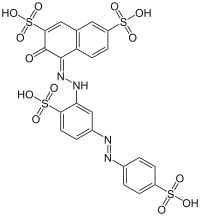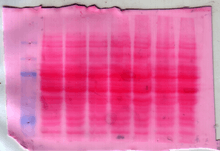Ponceau S
 | |
| Identifiers | |
|---|---|
3D model (JSmol) |
|
| ChEBI | |
| ECHA InfoCard | 100.025.745 |
| |
| |
| Properties | |
| C22H16N4O13S4 | |
| Molar mass | 672.63 g·mol−1 |
Except where otherwise noted, data are given for materials in their standard state (at 25 °C [77 °F], 100 kPa). | |
| Infobox references | |
Ponceau S, Acid Red 112, or C.I. 27195 (systematic name: 3-hydroxy-4-(2-sulfo-4-[4-sulfophenylazo]phenylazo)-2,7-naphthalenedisulfonic acid sodium salt[1]) is a sodium salt of a diazo dye of a light red color, that may be used to prepare a stain for rapid reversible detection of protein bands on nitrocellulose or polyvinylidene fluoride (PVDF) membranes (Western blotting), as well as on cellulose acetate membranes.[2] A Ponceau S stain is useful because it does not appear to have a deleterious effect on the sequencing of blotted polypeptides and is therefore one method of choice for locating polypeptides on Western blots for blot-sequencing.[2] It is also easily reversed with water washes, facilitating subsequent immunological detection.[2] The stain can be completely removed from the protein bands by continued washing.[2] Common stain formulations include 0.1% (w/v) Ponceau S in 5% acetic acid or 2% (w/v) Ponceau S in 30% trichloroacetic acid and 30% sulfosalicylic acid.[3]

See also
References
- ↑ "Ponceau S solution". Sigma-Aldrich. Retrieved 2016-11-24.
- 1 2 3 4 Al-Amoudi, M. S.; Salman, Mahmoud; Al-Majthoub, M. M.; Adam, Abdel Majid A.; Alshanbari, Naif A.; Refat, Moamen S. (9 October 2013). "Spectral studies to increase the efficiency and stability of laser dyes by charge-transfer reactions for using in solar cells: charge-transfer complexes of Ponceau S with p-chloranil, chloranilic and picric acids". Research on Chemical Intermediates. doi:10.1007/s11164-013-1417-4.
- ↑ "Ponceau S solution". Sigma-Aldrich. Retrieved 2016-11-24.
The following are two common stain formulations…